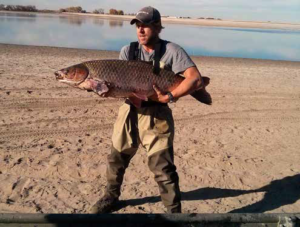“Lakespert” – If Carp had a Newsletter
Steve Lundt, CLM

Pound for pound, this large grass carp still looks the smartest. Photo by Steve Lundt.
I think they would have a “humanspert” giving advice on how to outsmart Seriously, I have spent the last eight years trying to remove as many common carp from a reservoir, and they seem to always find a way to outsmart me.
When it comes to fisheries for our lakes and reservoirs, there seems to be a disconnect between the different camps –water quality scientists/CLMs and lake managers/fishery biologists. Water quality folks tend to focus on monitoring for nutrients, observing response parameters, and finding ways to overthink how to slow down cultural eutrophication with chemicals and pumps. The fisheries experts focus on selling fishing licenses, stocking catchable predators, and making sure there are enough feeders stocked to support the non-sustainable predators. Both camps tend to forget that there is a direct connection between fisheries and water quality, especially out here in the west where everyone wants to catch some trout.
How many times have we heard of a government agency stocking lakes and streams with fish that only later become problematic for native fish species or become dependent on expensive restocking methods? Many of these management decisions are driven more by economics and recreational pressures, then by understanding how lake water quality can support a healthy fish community and a healthy fish community can support long-term water quality improvements.
If we balance our efforts for improving lakes across North America between understanding the parts per billion of nutrients and the overall fish communities, then we might see longer- term improvements in the overall lake ecosystem. For example, one might see a better zooplankton community that keeps algae in check when filter-feeding gizzard shad are not used so heavily as feeders for stocked trout, walleye, and other predator fish. Zooplankton are often forgotten, but are key to keeping algae in check and providing food to smaller fish.
Back to carp being smarter than me. I have personally removed just over 8,000 carp out of a reservoir in Colorado. Using everything from seins to electricity, I have learned that carp are smart, sensitive, and adaptable. I think humans need to take note and be more like carp when it comes to overall lake management – be smart, sensitive, and adaptable.
Fisheries and water quality go hand in hand. Let’s remember to focus on how they both reflect each other and how we can use both to our advantage when it comes to lake protection, restoration, and fisheries.
Now back to my vision of what a carp newsletter would look like . . . .
 Steve Lundt, Certified Lake Manager, has monitored and worked to improve water quality at Barr Lake (Denver, Colorado) for the past 19 years. Steve is active with the Colorado Lake & Reservoir Management Association and is a past Region 8 director for NALMS and an active member since 1998.
Steve Lundt, Certified Lake Manager, has monitored and worked to improve water quality at Barr Lake (Denver, Colorado) for the past 19 years. Steve is active with the Colorado Lake & Reservoir Management Association and is a past Region 8 director for NALMS and an active member since 1998.

